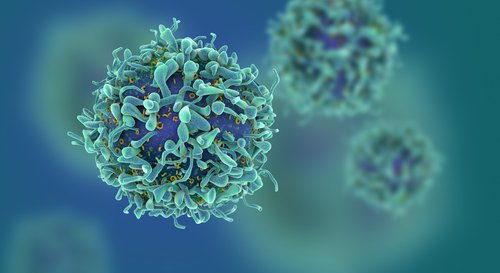People with relapsed or refractory chronic lymphocytic leukemia or small lymphocytic leukemia (CLL/SLL) who were treated with Imbruvica (ibrutinib) in a clinical trial — and then followed for several years — continue to show positive survival outcomes, new trial data shows.
The data were released at the recent 2017 Annual Meeting of the American Society of Clinical Oncology (ASCO) in Chicago, in a poster presentation titled “Long-term efficacy and safety with ibrutinib (ibr) in previously treated chronic lymphocytic leukemia (CLL): Up to four years follow-up of the RESONATE study.”
The original study, an international multi-center Phase 3 trial called RESONATE (NCT01578707), enrolled 391 patients with relapsed or refractory CLL/SLL who had already received treatment with at least one other prior therapy. Patients were treated with either Imbruvica or Arzerra (ofatumumab) for up to 24 weeks. Initial results demonstrated improved progression-free survival in the Imbruvica group.
Now, long-term follow-up data continues to show improved outcomes, with 59 percent of patients treated with Imbruvica still showing no signs of disease progression three years after receiving treatment, compared to 3 percent in the control group. High-risk patients were noted to have more favorable outcomes.
At the time of analysis, 68 percent of patients initially assigned to the control group had crossed over to Imbruvica. The median overall survival had not been reached for either arm, but 74 percent of patients in the Imbruvica arm were still alive after three years.
Overall, 91 percent of treated patients achieved at least a partial response, with complete responses increasing over time.
“These results suggest ibrutinib continues to provide persistent responses over the long-term in patients with chronic lymphocytic leukemia, including those who are difficult to treat,” John C. Byrd, MD, the study’s lead investigator, said in a press release.
CLL is a common form of leukemia in adults, with more than 20,000 new cases diagnosed annually. The disease, which primary affects the elderly, starts in the bone marrow before spreading to the blood.
Imbruvica, a first-in-class Bruton’s tyrosine kinase (BTK) inhibitor, is the first chemotherapy-free treatment for patients with CLL. By inhibiting BTK, the medication blocks signals that lead to the multiplication and spread of malignant B-cells. It is being studied as a stand-alone therapy and in combination with other treatments for several different types of cancer.
To date, more than 25,000 CLL patients have been treated with Imbruvica — an FDA-approved treatment for certain CLL, SLL, Waldenström’s macroglobulinemia, previously-treated mantle cell lymphoma, and marginal zone lymphoma patients.
“As a clinician who has treated patients with CLL for more than 20 years, I’m pleased to see the potential for efficacy and safety responses to continue over an extended period of time,” Byrd added.
About 130 clinical trials are currently investigating Imbruvica as a treatment, 14 of which are advanced, Phase 3 studies. Imbruvica is being jointly developed and marketed by Pharmacyclics, an AbbVie company, and Janssen Biotech.


